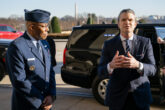May 28, 2014
When 9,800 Doesn't Equal 9,800
News coverage of President Obama's speech at West Point Wednesday focused on one seemingly hard and fast statement: The United States will keep 9,800 troops in Afghanistan next year, ensuring that the nation's longest war continues a little longer. The 9,800 troop figure has been repeated so often, and in so many places, that it actually obscures a key point: An invisible army of American diplomats, intelligence personnel, civilian government officials, and contractors will remain in Afghanistan well in the future, likely outnumbering the 9,800 troops that will be there next year and the smaller numbers of troops that will be there in the years to come.
The size, scope, composition, and duration of that civilian mission to Afghanistan will hinge on the way the Obama administration answers four questions: (1) what does Washington plan to do in Afghanistan; (2) how will the White House divide those missions among military, civilian, and contractor personnel; (3) what level of risk should the United States be willing to accept for our missions and our personnel; and (4) how much will Washington rely on allies, both Afghan and international, to shoulder the burden going forward. Depending on how the administration answers those questions, and what mixture of civilians and contractors it chooses to field, the U.S. civilian presence in Afghanistan could grow to be two or three times as large as the military mission there -- or more.
More from CNAS
-
National Security Has a Human Capital Problem and There’s No Fast Way Out
National security doesn’t really exist without the military forces and supporting civilians to carry it out. Recruitment remains a problem for the armed forces. And there’s a ...
By Katherine L. Kuzminski
-
The Department of Defense’s Breakthrough Nuclear Moment Risks Slipping Away
Unless they act, the Department of Defense’s breakthrough nuclear moment may vanish before it really happens....
By Will Rogers
-
Sharper: National Security Human Capital
U.S. national security depends on the nation’s ability to leverage the expertise of uniformed warfighters and the highly skilled civilian professionals who develop and impleme...
By Charles Horn & Taren Sylvester
-
Hegseth Brings the Culture War to Combat
The fundamental challenge of military leadership lies in creating cohesive teams that can work together in an environment of mortal risk and, when called upon to do so, use le...
By Dr. Jason Dempsey




